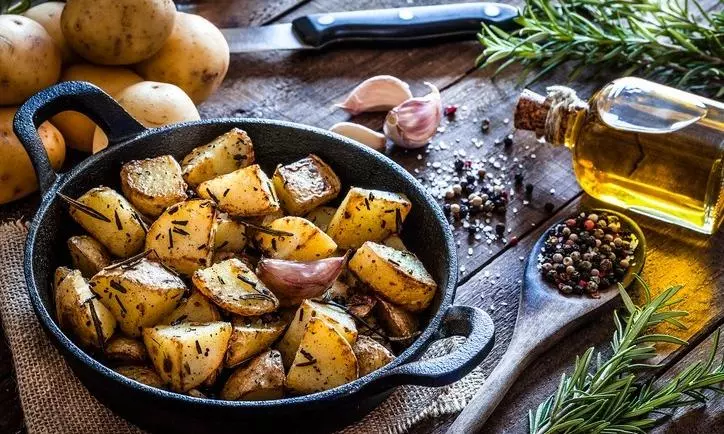Potatoes are not bad boys; what matters is how you cook them: Research
Two independent studies, one each from the US and India, show how the preparation of the humble potato shapes both long-term health and day-to-day nutrition


French fries may raise the risk of diabetes — but microwaving potatoes with their skin intact can help retain key nutrients. Two independent studies, one each from the US and India, show how the preparation of the humble potato shapes both long-term health and day-to-day nutrition.
While French fries raise the risk of diabetes, baked, boiled, or mashed potatoes do not, researchers in the US reported on Thursday, August 7, in what they describe as the most comprehensive study yet to examine how cooking methods influence the risk.
Doctors and many among the public have long known that potatoes — a rich source of starch that can cause spikes in blood sugar — are linked to an elevated diabetes risk. But few studies have explored how cooking methods, or replacing potatoes with other foods, might alter that risk.
Also read: Private school children in Delhi are more likely to be obese: AIIMS study
Three weekly servings
Researchers at the Harvard TH Chan School of Public Health, Boston, Massachusetts, analysed the eating habits and health outcomes of over 2,05,000 people across 30 years and found that eating three weekly servings of potatoes raised the risk of Type-2 diabetes by five per cent — and by 20 per cent if the potatoes were French fries. Baked, boiled, or mashed potatoes did not increase the risk significantly.
Also read: This rice variety could tackle diabetes epidemic in South India
Their findings, published in The British Medical Journal on Thursday, showed that replacing potatoes with whole grains reduced diabetes risk — by 8 per cent overall, and by 19 per cent when French fries were swapped. Replacing baked, boiled, or mashed potatoes led to a 4 per cent drop.
It's all in the cooking
The findings move the debate beyond whether potatoes are good or bad, said Seyed M Mousavi, a nutrition researcher and the study’s lead author. “A more nuanced — and useful — question is: How are they prepared and what might we eat instead?” he asked.
Desi potato dishes that are healthy & delicious
Jeera aloo: A simple stir-fried dish made with boiled, skin-on potatoes sautéed in cumin seeds, green chilies, and basic spices. Retaining the skin enhances fibre content and adds a rustic texture.
Aloo chaat: A tangy, spicy street-style snack where roasted or boiled skin-on potatoes are tossed with chaat masala, lemon juice, onions, and coriander. Using the skin preserves antioxidants and minerals.
Potato roast (South Indian style): This dry curry uses small skin-on potatoes roasted with mustard seeds, curry leaves, turmeric, and red chili powder, offering both crunch and nutrition.
Baked aloo tikkis: These are shallow-fried or oven-baked patties made with mashed, skin-on potatoes mixed with peas, spices, and herbs. A healthier alternative to deep-fried snacks, they retain the fibre from the peel.
Tandoori aloo: Marinated baby potatoes (with skin) in a spiced yogurt mix and grilled or baked for a smoky flavor. Commonly served as a starter or in wraps, this dish is rich in taste and nutrients.
Mousavi and his colleagues analysed 30 years of data from three large US health studies. None of the participants had diabetes at the start, but over time, around 22,200 developed the disease.
Also read: One out of every 4 diabetes patients in the world lived in India in 2022: Lancet study
While the Harvard study focused on long-term disease risk, researchers in India turned their attention to the potatoes’ day-to-day nutritional value.
What Indian researchers say
Scientists at the Central Potato Research Institute (CPRI), Shimla, found that microwaving potatoes with the skin intact preserved up to 12 times more Vitamin C than peeling or boiling them.
“Our research suggests that dry heat from an electric or microwave oven or a traditional chulha is the best way to cook potatoes for optimum nutrition,” said Bandana Kaundal, a scientist at CPRI’s regional station in Meerut, who led the nutrition study published earlier this year in Current Science, a journal of the Indian Academy of Sciences, Bengaluru.
Previous research had shown that potatoes cooked with their skins provide more fibre, potassium, and Vitamin C. The CPRI study directly compared steaming and microwaving and found that microwaving retained significantly more Vitamin C than steaming.
These insights have emerged against a backdrop of rising diabetes numbers in India. Estimates suggest that 101 million people in the country have diabetes and another 136 million have prediabetes, which, if unchecked, could progress to full-blown diabetes.
Biologically plausible
Kaundal, who was not involved in the Harvard study, said its findings are biologically plausible, even if the precise mechanisms underlying the diabetes risk aren’t fully understood.
“The findings raise important questions,” she said. “Is the increased risk due to added fats, high temperatures, the loss of nutrients, or a combination of all three? How much might switching from deep-frying to air-frying or oven-baking help reduce that risk?”
Other studies have shown that deep-frying potatoes produces harmful compounds — such as heterocyclic amines — that form at high temperatures and have been linked to Type-2 diabetes, heart disease, and certain cancers.

